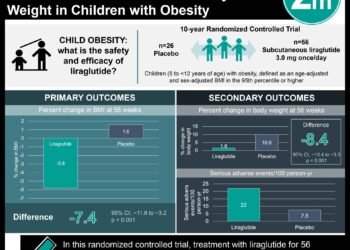Head Start linked to healthy changes in BMI
1. Overweight and obese preschool-aged children who entered the federally funded Head Start program had significantly greater decreases in body mass index by the start of kindergarten than children from a comparison primary health care system.
Evidence Rating Level: 2 (Good)
Study Rundown: Head Start is a federally funded program which offers early education, health, nutrition, and parent involvement services to preschool-aged children living in poverty. At baseline, children attending this program have higher rates of obesity than the national average. While Head Start has been associated with improved developmental outcomes for participants, no research has investigated the effect of the program on body mass index (BMI). The current study was focused on analyzing changes in children’s BMI at various Head Start agencies and comparing them to age-matched samples. It was found that overweight and obese children who participated in the Head Start program had significantly greater decreases in BMI than the comparison groups from a primary care health system. This study may be limited by lack of generalizability due to its focus on a single Michigan healthcare system as comparison as well as the lack of focus on children’s attendance rates in the program. However, results were significant and indicate the difference that Head Start can make in helping appropriately-referred overweight or obese children move toward a healthier BMI prior to kindergarten entry.
Click to read the study published today in Pediatrics
Relevant Reading: Tracking of childhood overweight into adulthood: a systematic review of the literature
In-Depth [retrospective cohort]: Data of 19 023 children from 12 Michigan Head Start programs and 24 725 children from primary care clinics (Medicaid insured and non-Medicaid) in the University of Michigan Health System were included in this study. Anthropometric data was obtained from these Head Start programs and also from primary care clinics from February, 2005 through August, 2013. BMI, BMI percentiles, and z-scores were calculated from provided data. At the start of the observation period 16.8%, 12.3%, and 6.8% of the children were categorized as obese in the Head Start, Medicaid, and non-Medicaid sample groups, respectively. At the end of the study period obese children in the Head Start group (1.66 ± 0.06) had a significantly lower mean BMI z-score than the Medicaid (2.04 ± 0.08, p < .001) and non-Medicaid (1.84 ± 0.05, p < .001) groups. Also, overweight children in the Head Start group had a significantly lower mean BMI z-score than both of the comparison groups (p < .001 for both). Underweight children from the Head Start group (-1.00 ± 0.12) finished with a mean BMI z-score which did not differ significantly from the Medicaid group (-1.32 ± 0.19) and was significantly greater than the non-Medicaid group (-1.48 ± 0.08).
More from this author: Updated sports physical from not required in most states, Many NICU deaths associated with potentially modifiable factors, Use of infant bedding remains high despite recommendations, Prenatal lead exposure and calcium intake linked to postnatal growth, Individually taught, parent-implemented social intervention may improve autism outcomes
Image: CC/US Dept of Agriculture/Wiki
©2014 2 Minute Medicine, Inc. All rights reserved. No works may be reproduced without expressed written consent from 2 Minute Medicine, Inc. No article should be construed as medical advice and is not intended as such by the authors, editors, staff or by 2 Minute Medicine, Inc.







